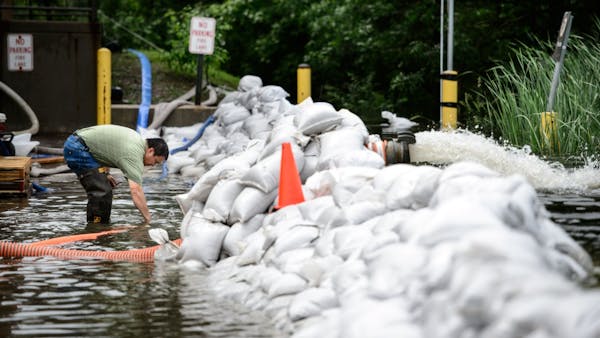Parents scrambling to find indoor plans for their kids, workers rained out of summer hours and lakeside businesses struggling to fill seats.
Welcome to the Soggy Summer of 2014, even tougher to take after a grueling winter.
At Lord Fletcher's on Lake Minnetonka, business has dropped 25 percent. Minneapolis closed six of its golf courses Thursday, a loss of tens of thousands of dollars. "It gets old," said Marc Rymer, assistant manager at Columbia Golf Course.
If there is a silver lining, it's at White Bear Lake, where recent downpours have helped replenish the shrunken lake. Other winners: the Children's Museum in St. Paul, where attendance was up 50 percent Thursday, and companies that clean up flooded basements.
Summer camp activities were rained out when mountain bike trails washed away. Campers at Theodore Wirth Park were forced to reschedule Thursday's itinerary of canoeing, biking and roller blading as thunderstorms battered nearby, director Allie Rykken said.
Instead, instructors occupied the kids who showed up with yoga, board games and strength challenges inside.
"I think most of the parents were able to keep their kids at home or come up with an alternative plan," said Rykken, who runs the five-week Loppet Adventure Camp.
Golf courses have been oversaturated for more than a week, and in some cases altogether flooded. One of the busiest Minneapolis courses that closed, Hiawatha, was 60 percent under water midafternoon Thursday.
"For us, it's a very significant blow," said Sarah Ackmann, who heads golf, ice and winter programs. Between $3,000 and $5,000 per golf course is lost each day it's closed, she said, figures that don't include concession sales.
2 lakes, 2 different stories
Along Lake Minnetonka, where waters have surged over banks at an all-time high elevation, strict no-wake restrictions have essentially brought recreational boating to a standstill. Local bars and restaurants that rely heavily on boaters for their clientele have lost significant business as a result.
More than half of the docks at Lord Fletcher's Old Lake Lodge are underwater, making access to the wharf's restaurant by boat difficult — if not impossible.
If boaters were to obey the no-wake laws, it would take about 1.5 hours to get across the lake, general manager Tom Emer said.
"The boaters are all extremely disappointed," he said. "Typically our clientele would be out three to four times a week, but many haven't been out at all because they don't like the no-wake" policy.
Just 18 months ago, White Bear Lake had dropped to its lowest depth ever recorded. Now, it's at its highest level in more than five years.
Plummeting levels of the lake have been a long-running cause for alarm. Since the beginning of 2014, however, it has risen steadily, reaching 921.8 feet Thursday, a level not seen since late 2008. It has risen nearly half a foot in the past week alone.
But Bryan DeSmet, vice chairman of the White Bear Lake Conservation District, said the surge is temporary and levels should recede again once the rainy weather pattern dissipates.
The high water is good news for Jason Brown, owner of White Bear Boat Works, a marina and watercraft repair business. Marina slips have been filling up along with the lake.
"The storms bring us business," said Brown, keeping a watchful eye on the weather radar. "I could take a break from the steady rain, but this has been a positive."
Yanking out docks
In Washington County, rising water has sharply curtailed activities at Lake Elmo Park Reserve, a popular metro area destination. On Thursday, parks employees hitched a tractor to submerged boat docks and gangplanks and pulled them out of the lake, county parks manager Mike Polehna said.
The park's swim pond, often crowded to capacity on hot summer days, now is sometimes deserted, he said. "We've had to send lifeguards home and close concession stands."
In some northern parts of the state, businesses are operating as normal with little effect from the weather. At Cragun's Resort in Brainerd, golf courses continue to book solid throughout the week. The largest impact from the sporadic storms downstate has been mental, Cragun's manager Susan Hamilton said.
Twin Cities area residents assume that what affects them also affects the entire state, she said. That means they assume it's raining Up North and never bother to check.
"They never pick up the phone because they're sitting in the middle of rain," Hamilton said.
Staff writers Kevin Giles, Nicole Norfleet and Jim Anderson contributed to this report.
Liz Sawyer • 612-673-4648
![St. Louis County Board approved a plan to distribute $24 million in CARES funding, including $6 million to be distributed to small businesses. ] ALEX](https://arc.stimg.co/startribunemedia/ED62G7Y2RWISNRUZQRT3ZTJVHU.jpg?h=91&w=145&fit=crop&bg=999&crop=faces)
Duluth man sentenced to 40 years for role in drive-by shooting that killed 19-year-old

Man killed in Minnetonka by law enforcement started gun battle with deputies, BCA says
Woman charged after police recover 124 cats from Crystal home
Neal: Future can't come fast enough for Wild

